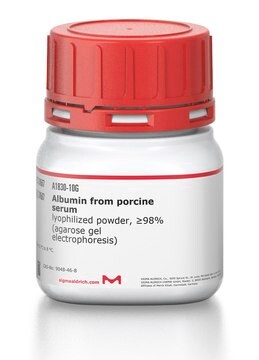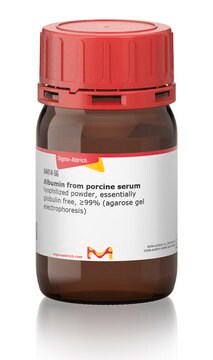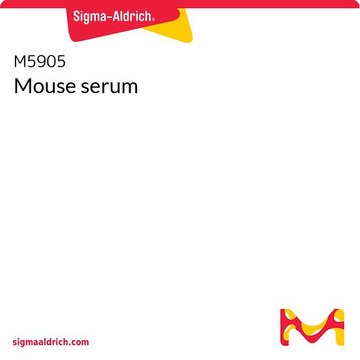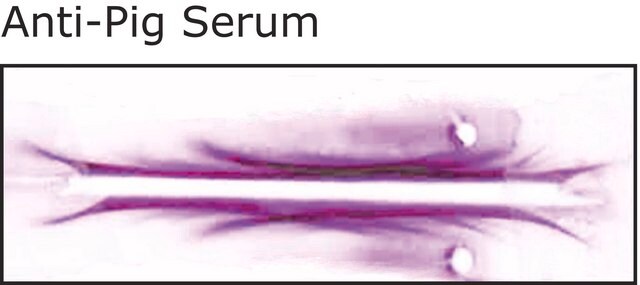A2764
Albumin from porcine serum
lyophilized powder, 96-99% (agarose gel electrophoresis)
Sign Into View Organizational & Contract Pricing
All Photos(1)
About This Item
Recommended Products
biological source
Porcine
Quality Level
Assay
96-99% (agarose gel electrophoresis)
form
lyophilized powder
technique(s)
ELISA: suitable
UniProt accession no.
storage temp.
2-8°C
Gene Information
Porcine ... ALB(396960)
Looking for similar products? Visit Product Comparison Guide
General description
Albumin, the most abundant plasma protein (60%), is synthesized in the liver. It performs several functions. Porcine serum albumin (PSA), a globular protein, is a major allergen in pork.
Application
Albumin from porcine serum:
- may be used in metal competition studies to get loaded with copper(II)/Cu(II) for affinity constant measurements and to investigate its secondary specific Cu(II) binding site
- has been used as a macromolecule marker for colostrum feeding and as a purified antigen to measure porcine serum albumin (PSA) in milk and plasma by quantitative immunoelectrophoresis
- has been used in the production of anti-albumin antisera for the detection of meats of different animal species in commercial hamburger samples using dot-ELISA (enzyme-linked immunosorbent assay)
comparable product
Product No.
Description
Pricing
Storage Class Code
11 - Combustible Solids
WGK
WGK 3
Flash Point(F)
Not applicable
Flash Point(C)
Not applicable
Personal Protective Equipment
dust mask type N95 (US), Eyeshields, Gloves
Choose from one of the most recent versions:
Already Own This Product?
Find documentation for the products that you have recently purchased in the Document Library.
A Macedo-Silva et al.
Meat science, 56(2), 189-192 (2000-10-01)
The use of low cost meats to adulterate meats and meat products has been reported. Appropriate methods of analysis then are needed in order to detect this practice. The dot-ELISA method was used to identify the meat of different animal
W Bal et al.
Journal of inorganic biochemistry, 70(1), 33-39 (1998-07-14)
Circular dichroism and electron spin resonance spectroscopy are used to investigate the second specific metal binding site on human, bovine and porcine albumins. Ni(II), Zn(II) and Cd(II) can displace Cu(II) from the second Cu(II) site but not from the first
Robert Kumagai et al.
Free radical biology & medicine, 47(5), 600-607 (2009-06-09)
Although the glycocalyx has been implicated in wall shear stress (WSS) mechanotransduction, the role of glycocalyx components in nitric oxide (NO) and reactive oxygen species (ROS) production remains unclear. Here, we tested the hypothesis that glycocalyx is implicated in both
M Morales et al.
Neuroscience, 152(1), 70-81 (2008-01-29)
The notion of functional interactions between the alpha7 nicotinic acetylcholine (alpha7 nACh) and the cannabinoid systems is emerging from recent in vitro and in vivo studies. Both the alpha7 nACh receptor and the cannabinoid receptor 1 (CB1) are highly expressed
Stephanie K Aoki et al.
Molecular microbiology, 70(2), 323-340 (2008-09-03)
Contact-dependent growth inhibition (CDI) is a phenomenon by which bacterial cell growth is regulated by direct cell-to-cell contact via the CdiA/CdiB two-partner secretion system. Characterization of mutants resistant to CDI allowed us to identify BamA (YaeT) as the outer membrane
Our team of scientists has experience in all areas of research including Life Science, Material Science, Chemical Synthesis, Chromatography, Analytical and many others.
Contact Technical Service






